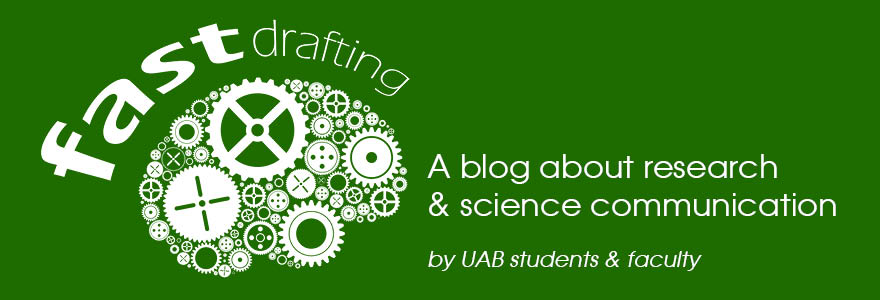Posted by Lesley McCollum
At the University of Alabama in Birmingham (UAB), as in academia as a whole, the number of peer-reviewed publications is often used to measure a researcher's success. With the focus on research writing, much less consideration is given to writing for the public, but maybe it's time to re-think this practice.With scientific literacy and research funding on the decline nationally, we should all consider learning how to write for a public audience, whether it is published in a general media source, such as the New York Times, Time, or Slate, or in a science focused outlet such as ScienceNews, Popular Science, or Discover. These types of publications aren't measured with impact factors or number of citations, but from a public policy standpoint, they are just as weighty. Scientific research is often inaccessible to the general public, whether it's hidden behind a paid subscription or dense scientific detail and jargon. At UAB, scholars like Dr. James McClintock are starting to change that with articles or opinion pieces for their city newspapers, consumer magazines like Scientific American, and books for the popular press, like Lost Antarctica: Adventures in a Disappearing Land.
At the University of Alabama in Birmingham (UAB), as in academia as a whole, the number of peer-reviewed publications is often used to measure a researcher's success. With the focus on research writing, much less consideration is given to writing for the public, but maybe it's time to re-think this practice.With scientific literacy and research funding on the decline nationally, we should all consider learning how to write for a public audience, whether it is published in a general media source, such as the New York Times, Time, or Slate, or in a science focused outlet such as ScienceNews, Popular Science, or Discover. These types of publications aren't measured with impact factors or number of citations, but from a public policy standpoint, they are just as weighty. Scientific research is often inaccessible to the general public, whether it's hidden behind a paid subscription or dense scientific detail and jargon. At UAB, scholars like Dr. James McClintock are starting to change that with articles or opinion pieces for their city newspapers, consumer magazines like Scientific American, and books for the popular press, like Lost Antarctica: Adventures in a Disappearing Land.
My research focus is on mental health which is one area particularly in need of education for the general population, for many reasons in addition to improving public support and funding. But public awareness and support do play a strong role in research funding, and both can be improved through communicating our research through writing. Fortunately, popular journals like Psychology Today continue to bring the best science to the public. And science writers like Liza Gross, a freelance writer and senior editor at the biomedical journal PLOS Biology, are helping to change that. In a blog post for KQED Science, Gross writes memorably about a museum exhibit that shows how our concepts of mental health and definitions of "normal" have evolved over time. For today's scientist, the pen, not just the lab, is a powerful tool for supporting research.



